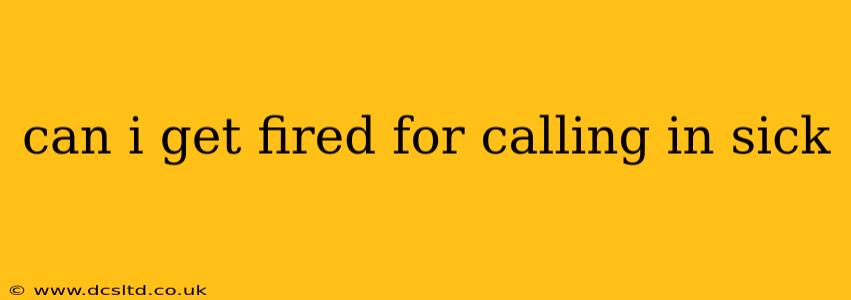Can I Get Fired for Calling in Sick?
Calling in sick is a necessary part of life, but the fear of job repercussions can make even legitimate absences stressful. The short answer is: it depends. While you generally have the right to take time off when you're ill, your employer also has rights and responsibilities. Let's break down the factors that determine whether calling in sick could lead to termination.
What are my legal protections?
In many countries, including the United States, there are no federal laws mandating sick leave. However, some states and municipalities have enacted laws providing paid or unpaid sick leave. These laws vary significantly in their provisions, including the amount of leave allowed and eligibility requirements. Checking your state or local laws regarding sick leave is crucial. If your employer violates these laws, you may have legal recourse.
What if I have an employer-provided sick leave policy?
Many employers offer sick leave policies in their employee handbooks or contracts. These policies typically outline the process for calling in sick, the amount of sick time accrued, and any associated limitations. Carefully review your employer's policy. Failure to adhere to the outlined procedures could be grounds for disciplinary action, up to and including termination. This might include things like providing insufficient notice, failing to follow the required notification procedure (e.g., calling a specific number or person), or abusing the sick leave policy.
How often is too often?
Excessive absenteeism, regardless of the reason, is a significant concern for employers. Consistent sick days, even if legitimate, can disrupt workflow and productivity. Employers have a legitimate interest in maintaining a reliable workforce. While a few sick days here and there are usually acceptable, a pattern of frequent absences can raise red flags. Your employer may initiate disciplinary action if your absences become excessive and negatively impact the workplace.
What constitutes "sick"?
This is a grey area. While genuine illness is a valid reason for calling in sick, employers are understandably wary of abuse. Your employer doesn't necessarily need proof of illness, but if you frequently call in sick for vague reasons or your absences seem suspicious, they may question the validity of your claims. Maintaining open and honest communication with your employer can help avoid misunderstandings.
What if my illness requires extended leave?
If your illness requires an extended absence, you may need to provide documentation from a medical professional. This is particularly relevant for longer absences or those requiring accommodation under disability laws (like the Americans with Disabilities Act in the US). Your employer may request this documentation to understand the nature of your illness and determine appropriate accommodations. Failing to provide necessary documentation when requested could lead to disciplinary action.
What should I do if I'm worried about losing my job?
The best approach is proactive communication. If possible, inform your employer as early as possible if you anticipate needing time off. Be honest and professional, and follow the procedures outlined in your company's policy. If you have a serious or ongoing health concern, seek guidance from your healthcare provider regarding appropriate documentation for your employer. Additionally, consulting an employment lawyer can offer valuable advice if you believe your rights have been violated.
Disclaimer: This information is for general guidance only and does not constitute legal advice. Consult with an employment lawyer or legal professional in your jurisdiction for specific advice relating to your situation and local laws.
